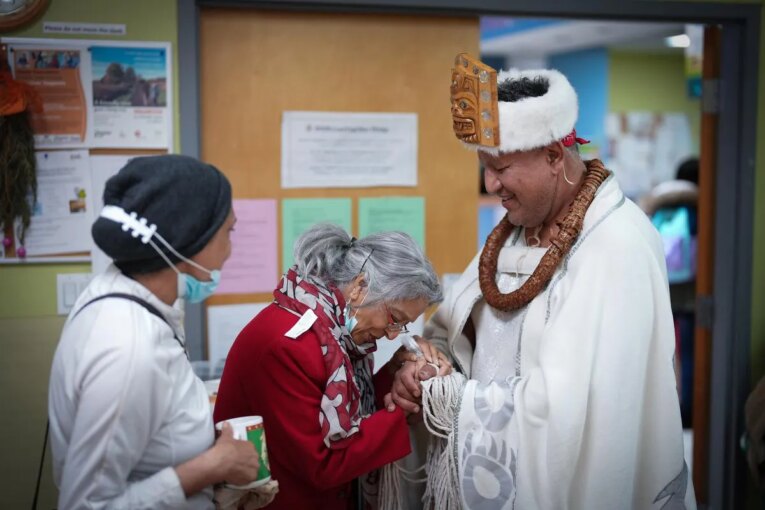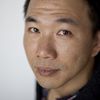
VANCOUVER—At the South Vancouver Neighbourhood House, Indigenous Elders Al Houston and Travis Angus are taking centre stage.
The pair walk into the full meeting room and smudge it, with the ritual burning of sacred plants.
“If we’re going to listen to one another, we’re going to be able to keep going forward,” Houston, president of the Greater Vancouver Native Cultural Society, tells those in attendance. “Your perfect example is right here in front of you. You’re asking questions and we are responding.”
Their audience at the community hub is a couple of dozen eager newcomers from Afghanistan, Egypt, Hong Kong, Nepal and the Philippines, who sit in a circle.
For the new immigrants, this “info and orientation circle” is their first look at the Indigenous past of the land where they have just settled.
For Houston, an Ojibwe Cree, and Angus of the Nisga’a Nation, this community program, The First Nations of Canada, is part of the mending of a broken relationship.
It is an example of reconciliation at its most essential, person-to-person level. For both communities, Indigenous Peoples and newcomers, it is uncharted territory.
Generations of immigrants settling in Canada have been kept away from the country’s horrific Indigenous history. For generations, Indigenous communities have been blamed by those unfamiliar with the history of this land for their social ills, whether it’s their poverty, substance abuse, health or relationship issues.
That distrust is often mutual. Some in the Indigenous communities view immigrants as continuing the relentless colonization of their ancestral lands.
But recent years, in the wake of the racial reckoning that made headlines in 2020 and the shock over the discovery of probable unmarked graves near residential school sites, have spurred the interest in relationship building with Indigenous people among new immigrants, the latest wave of settlers if not colonists.
“It’s kind of a watershed moment,” said Antje Ellermann, founding director of the University of British Columbia’s Centre for Migration Studies. “A lot of things are coming together. I’m hoping that and I do think that there will be a real generational difference.
“There is a lot of positive energy coming from newcomers, and openness and less defensiveness, because they don’t have family going back generations with that kind of pioneer spirit.”
And Vancouver — the unceded territory of the Musqueam, Squamish or Tsleil-Waututh peoples — seems to be leading the way.
Elders Houston and Angus both sit on the Indigenous Advisory Council at the South Vancouver Neighbourhood House and facilitate the orientation circle with newcomers, where they go over cultural practices and the travesties, such as residential schools, faced by Indigenous people in Canada.
“Let’s talk protocol,” Houston said. “In our culture, we can appreciate the applause, but technically in our culture we don’t like to clap because the spirits are awakened.” In the evening, whistling is also avoided, for the same reason.
Much of these teachings, he said, are passed down from Elders, but much of this culture was lost, due to the residential school system.
He tells bits of his own personal history, starting with his mother’s stay in a residential school and his own situation of being taken from his mother during the Sixties Scoop.
It was supposed to be for a short period while she dealt with her own challenges from her time in residential school, but Houston said the ordeal lasted years. Authorities told both the children and the mother they each did not want to be reunited. He did not see his mother again until she showed up at his hospital bed after he’d been hit by a car.
The accident made the newspaper and was the only reason his mother knew where to find him.
Silence settles down over the circle of chairs in the room.
“I looked at her and said, ‘I’ve waited all my life for this day to happen,’ ” said Houston. “That was the relationship rekindled right there because of the hope we never let go of.”
It used to make the 44-year-old man angry when he saw other Canadians taking more interest in newcomers and their culture than the issues faced by the first people on this land.
“We’ve become a minority in our own country. There’s still that stigma of First Nations that we’ve lived through,” noted Houston, who has become a regular guest in community events to talk about residential schools, history and cultures.
“People now are seeking us out. It never used to be like that. It’s a great feeling. Now we are getting a lot of compassion. People are wanting to understand and ask, ‘How can we help?’ ”
Toronto Metropolitan University geography professor Harald Bauder, himself an immigrant from Germany, has published numerous papers about immigration, settlement, colonialism and indigeneity.
He said he’s surprised immigration policy has garnered little attention within the Indigenous communities.
Among the 94 recommendations by the Truth and Reconciliation Commission, the last two address “newcomers to Canada” — revising the citizenship study guide and test to include more Indigenous content, and updating the oath of citizenship to observe treaties with Indigenous Peoples — and none deals with immigration policy.
“To me, as an immigration researcher, this is a core issue because immigration policy and selection is what has led to the conflict that we’re dealing with in settlement and colonialism to begin with,” he said. “Without immigration, you wouldn’t have settler colonialism. So why is the underlying force always just an afterthought?”
Bauder said immigrants and Indigenous people can forge great alliances with their respective experiences of colonization. While not every newcomer is a colonist, he adds, many themselves have lived the colonial legacies or have been displaced and oppressed due to their race and ethnicity.
“There’s afuture generations are going to have less unlearning to do.”
You can read more of the news on source




